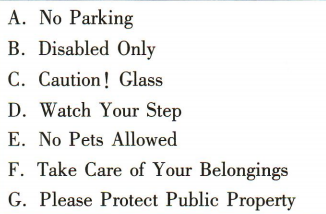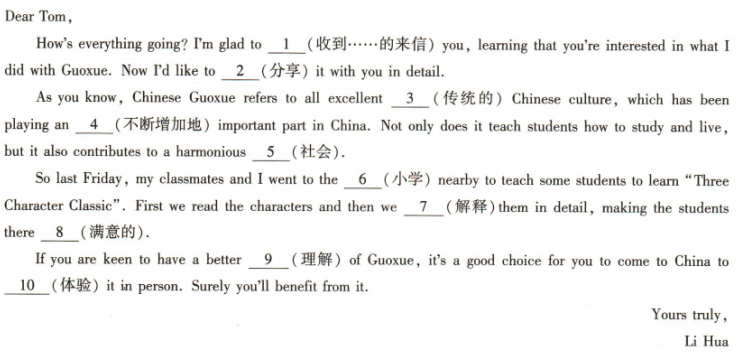2025年高职单招每日一练《英语(中职)》1月2日
考试总分:10分
考试类型:模拟试题
作答时间:60分钟
已答人数:176
试卷答案:有
试卷介绍: 2025年高职单招每日一练《英语(中职)》1月2日专为备考2025年英语(中职)考生准备,帮助考生通过每日坚持练习,逐步提升考试成绩。
试卷预览
-

1. 请您保管好自己的物品()ANo Parking
BDisabled Only
CCaution!Glass
DWatch Your Step
ENo Pets Allowed
FTake Care of Your Belongings
GPlease Protect Public Property
-
One day,as two little brothers were walking along the road,they met(1)old woman carrying a large basket of apples. The woman looked very pale and tired.The boys said to her,“Are you going to town?If you are,we(2)carry your basket.” “Thank you,”replied the woman.“You are very(3).You see I am weak and ill.” Then she told them that she was often ill,and had a disabled son to support. She lived in a village three(4)away,and was now going to the market to sell the apples(5)had grown on the only tree in her garden . “We are going the same way as you are,”said the boys.“Let us have the(6).”So they held it,and walked along(7). The old woman was(8),and said that she hoped their mother would not be angry(9)them.“Oh,no,” they replied.“(10)mother has taught us to be kind to everyone,and(11)useful in any way we can.” She then(12)to give them some of the sweet apples in return for their help.“No,thank you,”said the boys.“We don't want anything for(13)we have done.” When the old woman got(14),she told her son what had happened.Her son was(15)by the kindness of the two boys. Several days later,the old woman saw a little girl who stopped and(16)some banana skins in the middle of the road and threw them into a ditch(沟) .“I hope people will not(17)these on the road,”said the girl. “Someone may step on them,and(18). ” “That's right,my dear,”the woman said.“It's a(19)thing for you to do,but it shows that you have a thoughtful mind and a kind heart.Great things often(20)with little labors of love.”
2. 第3空填()。Akind
Bgreat
Csmart
Dhappy
-
1. I can hardly hear what he's saying,nor can the other people.
-
2. No pains,no gains.
-
1. ___________ (沿着这条街走五分钟),and you will see the cinema.
-
2. We have always worked to ______________ (使……满意)our customers through quality service.
-
1. 假设你是李华,你们学校现在有一个与加拿大温哥华(Vancouver)某高中互相交换学生的项目,你对此很感兴趣。请你给学校负责该项目的老师写一封信,申请参与这个项目。主要内容包括: (1)写信目的; (2)陈述想到该校当交换生的理由; (3)希望被接纳。 注意:词数应为100左右。

-
2. 以下是李华写给笔友Tom的一封信,介绍了自己和同学教小学生国学的有关情况。请根据括号里的中文信息将内容补充完整。

-
请根据以下短文内容,回答短文后面的问题,答题词数不得超过10个单词。 Many of us read news every day.It's probably because we'd like to know what's happening in the world.Today we can get news from TV or the Internet,but how did ancient people get news? At the very beginning,information spread by word of mouth.People living in tribes(部落)got news from neighbors or travelers.Ancient Romans changed the way people knew about their communities.They posted a list of daily happenings at public squares in the cities.Ancient Chinese people did it in another way.The government had news sheets sent to officials in the whole country so people could know what was going on in the capital. The fifteenth century saw big progress in printing technology in the West.The progress brought a sudden rise of news business.Printers sold whatever people loved to read.In the sixteenth century,the first real newspapers appeared.People started to form the habit of reading newspapers.They liked to share their opinions on newspapers.The invention of telegraph(电报)machines led to another big step in history.News stories were sent to the papers in minutes instead of weeks. Now we get news in seconds from all over the world.We can become some kind of reporters by posting online what happens around us.
1. Where did ancient Romans post a list of daily happenings?
-
请根据以下短文内容,回答短文后面的问题,答题词数不得超过10个单词。 Contrary to popular belief,colds are not caused by exposure to severe weather.Colds are caused by viruses inside,and you're safer when skiing or even waiting for the bus on a snowy day than you are in a warm room, surrounded by friends,co-workers,or fellow students,who just may be passing the viruses around.If you feel a chill,you're already sick.A chill is an early sign:It's the cold that causes the chill,not the other way around. While the virus can spread through air when a cold-sufferer coughs or sneezes,surprisingly,this is not the most common route of transmission.Numerous studies have now shown that the majority of colds are“caught”by hand contact.A cold-sufferer rubs her nose,thereby transferring the virus to her hand.Then a friend comes to visit.“Don't kiss me,”she warns,so the friend steps back and presses her hand.The friend then wipes her own nose or eyes,and several days later is stricken with a cold.Or parents pick up their child's used tissues and carefully throw them away,but fail to wash their hands afterwards. Cold viruses also can be transferred to objects—telephones,towels,plates—and remain infectious for up to three hours.Frequent hand-washing—on the part of the cold-sufferer as well as other members of the household— will minimize the spread of viruses.
2. How do most people catch colds?
相关试卷
-
2024年高职单招每日一练《英语(中职)》11月18日1899人做过
-
2024年高职单招每日一练《英语(中职)》11月19日1241人做过
-
2024年高职单招每日一练《英语(中职)》11月20日441人做过
-
2024年高职单招每日一练《英语(中职)》11月21日110人做过
-
2024年高职单招每日一练《英语(中职)》11月22日1117人做过
-
2024年高职单招每日一练《英语(中职)》11月23日224人做过
-
2024年高职单招每日一练《英语(中职)》11月24日595人做过
-
2024年高职单招每日一练《英语(中职)》11月25日1371人做过
-
2024年高职单招每日一练《英语(中职)》11月26日799人做过
-
2024年高职单招每日一练《英语(中职)》11月27日1154人做过
相关题库